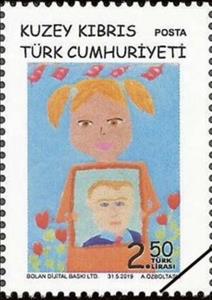Stamp: Ataturk and Children's Day Art Competition Winners (Northern Cyprus 2019)
Ataturk and Children's Day Art Competition Winners (Northern Cyprus 2019)
31 May (Northern Cyprus ) within release Ataturk and Children's Day Art Competition Winners (2019) goes into circulation Stamp Ataturk and Children's Day Art Competition Winners face value 2.50 Turkish new lira
| Stamp Ataturk and Children's Day Art Competition Winners in catalogues | |
|---|---|
| Colnect codes: | Col: TR-NC 2019-03b |
Stamp is square format.
Stamp from se-tenant strip of 3Also in the issue Ataturk and Children's Day Art Competition Winners (2019):
- Stamp - Ataturk and Children's Day Art Competition Winners face value 2.50;
- Se-tenant - Ataturk and Children's Day Art Competition Winners face value 3*2.50;
- Stamp - Ataturk and Children's Day Art Competition Winners face value 2.50;
- Stamp - Ataturk and Children's Day Art Competition Winners face value 2.50;
- Mini Sheet - Ataturk and Children's Day Art Competition Winners face value 12*2.50;
Stamp Ataturk and Children's Day Art Competition Winners it reflects the thematic directions:
Art is a diverse range of human activities in creating visual, auditory or performing artifacts (artworks), expressing the author's imaginative or technical skill, intended to be appreciated for their beauty or emotional power. In their most general form these activities include the production of works of art, the criticism of art, the study of the history of art, and the aesthetic dissemination of art. The oldest documented forms of art are visual arts, which include creation of images or objects in fields including painting, sculpture, printmaking, photography, and other visual media. Architecture is often included as one of the visual arts; however, like the decorative arts, or advertising, it involves the creation of objects where the practical considerations of use are essential—in a way that they usually are not in a painting, for example. Music, theatre, film, dance, and other performing arts, as well as literature and other media such as interactive media, are included in a broader definition of art or the arts. Until the 17th century, art referred to any skill or mastery and was not differentiated from crafts or sciences. In modern usage after the 17th century, where aesthetic considerations are paramount, the fine arts are separated and distinguished from acquired skills in general, such as the decorative or applied arts.
Biologically, a child (plural: children) is a human being between the stages of birth and puberty. The legal definition of child generally refers to a minor, otherwise known as a person younger than the age of majority. Child may also describe a relationship with a parent (such as sons and daughters of any age) or, metaphorically, an authority figure, or signify group membership in a clan, tribe, or religion; it can also signify being strongly affected by a specific time, place, or circumstance, as in "a child of nature" or "a child of the Sixties". There are many social issues that affect children, such as childhood education, bullying, child poverty, dysfunctional families, child labor, hunger, and child homelessness. Children can be raised by parents, by fosterers, guardians or partially raised in a day care center.
A festival is an event celebrated by a community and centering on some characteristic aspect or aspects of that community and its religion or cultures. It is often marked as a local or national holiday, mela, or eid. A festival constitutes typical cases of glocalization, as well as the high culture-low culture interrelationship. Next to religion and folklore, a significant origin is agricultural. Food is such a vital resource that many festivals are associated with harvest time. Religious commemoration and thanksgiving for good harvests are blended in events that take place in autumn, such as Halloween in the northern hemisphere and Easter in the southern.



